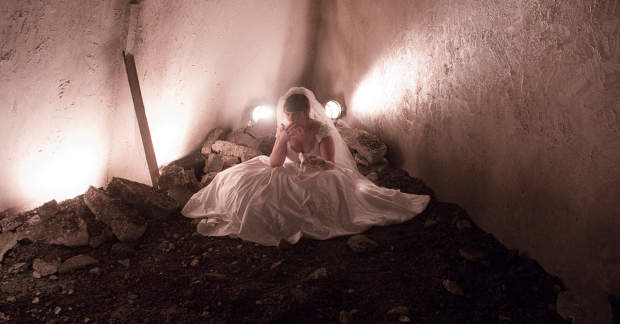On Corporation Street (HOME, Manchester)
ANU and HOME’s new show marks the twentieth anniversary of the bombing of Manchester by the Provisional IRA

On 15th July 1996 – 20 years ago yesterday – a bomb ripped through the centre of Manchester, the biggest in Britain since the Second World War. It tore through a street of shops, the Arndale Centre in particular. That's the image I remember, as a child: this blown-out high street, glass, timber and rubble; one bright red postbox standing unscathed in the middle. No-one died.
Those facts don't tell the full story, though, and neither does that image. The Arndale bomb might not have taken a life, but it shaped a load of them. Rather than the explosion itself, the singular historical event, Irish outfit ANU, who gave us a thrilling glimpse into Manchester's ganglands in Angel Meadow, focus on the shards that followed in a promenade piece that gets us up close and personal. Sprung from real testimonies, On Corporation Street lets ordinary Mancunians tell their stories. History isn't written, it's lived.
On HOME's stage, there's a lorry: russet-red frontage, white haulage, indicators flicking orange. It's that lorry – a ghostly sight; at once an artefact and a threat. A woman stands in front, shopping bag in each hand, blinking like a hostage. Next to it, she looks small and soft. The stage fills with others – with nurses and expectant mothers, teenage boys and football fans. As they speak, the blast drowns them out.
ANU let them talk to us directly. An alarm goes off in the theatre, ripping through the theatrical event, and we're evacuated backstage. Waiting for us, in dressing rooms and bare concrete corridors, are those affected. A mascara-stained bride took the bomb as a sign. Somewhere else, her groom is dancing down the hall. Two teenage boys have their worlds, quite literally, turned upside down. Some lives are ripped apart – a pregnant woman drops to the floor in agony. Others feel the ripples – another woman waits on the edge of an exclusion zone for her house keys to be returned. ANU have a gorgeous sensibility; an eye for the poetry and the banality of this event.
However, for all it seeks something more authentic, On Corporation Street snags on its own theatricality. The initial disjunction of an evacuation goes limp with contrivance and there's a blandness to being backstage that punctures the show itself. Sometimes, the walls are just too flimsy; the rubble, just too artfully arranged. With Corporation Street only a mile away and some of those affected in the audience, absence and artifice creep in. At times, it feels like a grisly grotto.
In a dressing room, sweetened by deodorant, you bump into one of the bombers. It's a startling encounter – a sharp reminder of the opposite perspective, that this act of terror had its reasons, not least to speed up the peace protest. He talks through the logistics – the mixing of explosives, the delivery of the truck, back in Dublin by nightfall – and offers a reminder of what might have been. An attempt to blow up Hammersmith Bridge failed the year before.
That contingency has its positives. In 20 years, Manchester has remade itself anew. The Council opted against an official commemoration because the city has "moved on" and ANU wonder, in a shiny new theatre, there isn't a price before progress. Perhaps you have to blast away the past to turn it into the future. Perhaps it takes violence to lay the ground for peace. Perhaps that postbox means more than the rubble.
On Corporation Street runs at HOME, Manchester until 25 June.












